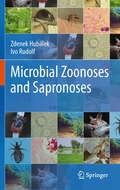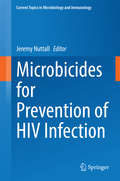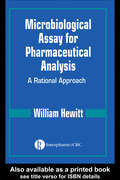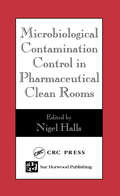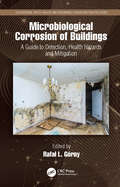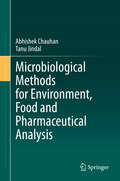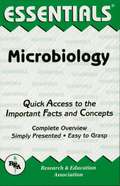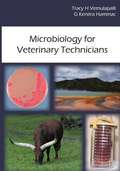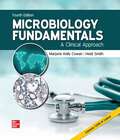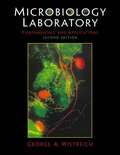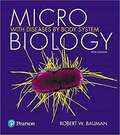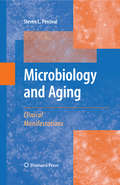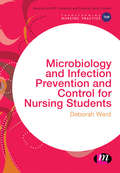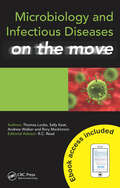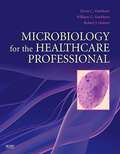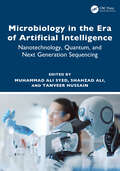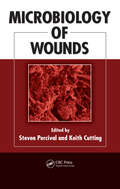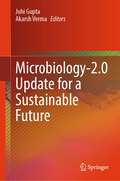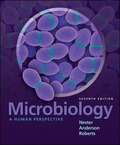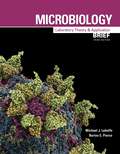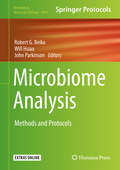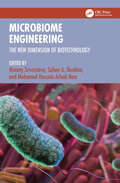- Table View
- List View
Microbial Zoonoses and Sapronoses
by Ivo Rudolf Zdenek HubálekThis book presents the state of art in the field of microbial zoonoses and sapronoses. It could be used as a textbook or manual in microbiology and medical zoology for students of human and veterinary medicine, including Ph.D. students, and for biomedicine scientists and medical practitioners and specialists as well. Surprisingly, severe zoonoses and sapronoses still appear that are either entirely new (e.g., SARS), newly recognized (Lyme borreliosis), resurging (West Nile fever in Europe), increasing in incidence (campylobacterosis), spatially expanding (West Nile fever in the Americas), with a changing range of hosts and/or vectors, with changing clinical manifestations or acquiring antibiotic resistance. The collective term for those diseases is (re)emerging infections, and most of them represent zoonoses and sapronoses (the rest are anthroponoses). The number of known zoonotic and sapronotic pathogens of humans is continually growing -- over 800 today. In the introductory part, short characteristics are given of infectious and epidemic process, including the role of environmental factors, possibilities of their epidemiological surveillance, and control. Much emphasis is laid on ecological aspects of these diseases (haematophagous vectors and their life history; vertebrate hosts of zoonoses; habitats of the agents and their geographic distribution; natural focality of diseases). Particular zoonoses and sapronoses are then characterized in the following brief paragraphs: source of human infection; animal disease; transmission mode; human disease; epidemiology; diagnostics; therapy; geographic distribution.
Microbicides for Prevention of HIV Infection
by Jeremy NuttallOne of the most promising new approaches for the prevention of HIV transmission, particularly for developing countries, involves topical, self-administered products known as microbicides. The development of microbicides is a long and complicated process, and this volume provides an overview of all the critical areas, from the selection of appropriate candidate molecules and their formulation, preclinical and clinical testing for safety and efficacy, strategies for product registration and finally, issues associated with product launch, distribution and access. The book will prove valuable to both those working in the field and all others who are interested in learning more about this product class, which has the potential to significantly impact the future of this devastating epidemic.
Microbiological Advancements for Higher Altitude Agro-Ecosystems & Sustainability (Rhizosphere Biology)
by Reeta Goel Ravindra Soni Deep Chandra SuyalThe book explores the challenges and opportunities associated with high-altitude agro-ecosystems and the factors that influence them. It discusses the various indigenous agricultural practices and approaches, as well as the microbiology of mountain & hill agro-ecosystems, providing a comprehensive overview of the various factors that control the microbiome at high altitudes.The contributions examine microbiological advances, such as use of “omics” technologies for hill agriculture and environmental sustainability, and explore the use of nanotechnology for agricultural and environmental sustainability at higher altitudes. The book also describes various aspects of low-temperature microbiology in the context of high-altitude farming and environmental sustainability.
Microbiological Assay for Pharmaceutical Analysis: A Rational Approach
by William HewittA user-friendly guide for the evaluation of microbiological assays, this book provides a lucid explanation of the sources of error in microbiological assay and helps analysts choose efficient assay designs that will minimize those sources of error. The author discusses microbiological assay as a branch of pharmaceutical analysis and distinguishes it from biological assay in general. He draws attention to the microbiological aspects that may not be so obvious to the chemical analyst and to the analytical aspects that may not be so obvious to the microbiologist. The book expands on the guidance given in pharmacopoeias and helps readers choose the assay design most appropriate for the purpose of their assay.
Microbiological Contamination Control in Pharmaceutical Clean Rooms
by Nigel HallsContamination control in pharmaceutical clean rooms has developed from a jumble of science and engineering, knowledge of what has worked well or badly in the past, dependent upon the technology available at the time the clean room was built and subsequent technological developments. Surrounding it all is a blanket of regulations. Taking a multidisc
Microbiological Corrosion of Buildings: A Guide to Detection, Health Hazards, and Mitigation (Occupational Safety, Health, and Ergonomics)
by Rafał L. GórnyEnvironmental stress caused by water continuously exposes buildings to microbial colonization. This is highly evident when both minor dampness and mass flooding occur. The text describes how microbiological corrosion of buildings and the structures and substances derived from these hazards are responsible for adverse health effects on people exposed to these contaminated environments. Microbiological Corrosion of Buildings: A Guide to Detection, Health Hazards, and Mitigation describes the key elements and methods for neutralising and removing microbiological contamination, and the operating algorithm for checking the effectiveness of preventative solutions. Ideal for construction engineers, microbiologists and professionals in the field. Features: Latest methods for detection of indoor microbial hazards Identifies the tools needed for natural, non-destructive and non-invasive methods of bio-corrosion removal Describes the social and health problems associated with exposure to microbiological hazards Provides case studies and examples of microorganisms responsible for microbial corrosion. ‘Climate change and the associated adverse effects, such as floods and whirlwinds, make the problem of microbiological corrosion of buildings that generates health risks and economic losses on a global scale, the focus of science and technology. The monograph presents a complex problem of building bio-corrosion, that requires knowledge of the distant fields of microbiology and building technology, for the use of both scientists and practitioners. This pioneering work of an interdisciplinary nature harmoniously combines knowledge on specific microbiological issues relating to the process of bio-corrosion and the associated health risks with detailed issues of construction technology concerning the prevention of bio-corrosion and its removal. The authors succeeded in combining a very high scientific level in the monograph with an accessible and understandable presentation of complex problems. The extensive references, ranging from "classical" items from many years ago to the most recent articles presenting the state of the art in this field, are worth emphasising.’ —Prof. Jacek Dutkiewicz, Ph.D., D.Sc., Institute of Rural Health in Lublin
Microbiological Methods for Environment, Food and Pharmaceutical Analysis
by Tanu Jindal Abhishek ChauhanThis book provides a broad account of various applied aspects of microbiology for quality and safety evaluations in food, water, soil, environment and pharmaceutical sciences. The work is timely, as the safety and quality of various commodities such as water and wastewater, food, pharmaceutical medications and medical devices are of paramount concern in developing countries globally for improved public health quality in areas ranging from food security to disease exposure. The book offers an introduction to basic concepts of biosafety and related microbiological practices and applies these methodologies to a multitude of disciplines in subject-focused chapters. Each chapter offers experiments and exercises pertaining to the specific area of interest in microbiological research, which will allow readers to apply the knowledge gained in a laboratory or classroom setting to see the microbiological methods discussed in practice. The book will be useful for industrialists, researchers, academics and undergraduate/graduate students of microbiology, biotechnology, botany and pharmaceutical sciences. The text aims to be a significant contribution in effectively guiding scientists, analysts, lab technicians and quality managers working with microbiology in industrial and commercial fields.
Microbiology Essentials (Essentials Study Guides)
by Tammy Mccormick Lauren GrossREA's Essentials provide quick and easy access to critical information in a variety of different fields, ranging from the most basic to the most advanced. As its name implies, these concise, comprehensive study guides summarize the essentials of the field covered. Essentials are helpful when preparing for exams, doing homework and will remain a lasting reference source for students, teachers, and professionals. Microbiology includes the history of microbiology, equipment and techniques, diversity of microorganisms, genetics, metabolism, transport of molecules, role of microbes in disease, microbes in the environment, and microbes in industry.
Microbiology For Veterinary Technicians
by Tracy Vemulapalli G. HammacMicrobiology for Veterinary Technicians introduces veterinary technician and technologist students to the complex and exciting world of microorganisms. Divided into four main parts, the book provides pertinent, up-to-date information regarding many different aspects of veterinary microbiology.
Microbiology Fundamentals: A Clinical Approach
by Heidi Smith Marjorie Kelly Cowan Jennifer LuskCowan's Microbiology Fundamentals: A Clinical Approachis a perfect fit for your microbiology course. The author team includes a practicing Registered Nurse who shows students how the content on each page relates to their lives and future career. McGraw Hill Connect® is aligned with the text and provides a highly reliable, easy-to-use homework and learning management solution that embeds learning science and award-winning adaptive tools to improve student results.
Microbiology Laboratory Fundamentals and Applications
by George A. WistreichThis comprehensive laboratory manual provides state-of-the-art techniques, concepts, and applications of microbiology. The overall approach is designed to start with basic concepts and procedures and to gradually build more advanced levels, strengthening readers' understanding and skills through the process. An invaluable reference as a refresher of basic concepts, techniques and procedures. Current, thorough coverage of topics including, but not limited to: cultivation techniques; microbial genetics; immunology; and medical microbiology. For laboratory technicians and medical laboratory technologists.
Microbiology With Diseases By Body System
by Robert BaumanKEY MESSAGE: Designed for pre-nursing and allied health readers, Microbiology with Diseases by Body System, 2/eretains the hallmark art program and clear writing style that have made Robert Bauman's book a success. Filled with intriguing content based on cutting-edge research that engages readers, the Second Edition features increased clinical coverage as well as a strong focus on the beneficial effects of microbes. Media Manager 2.1 provides instructors with the most robust media program available in the microbiology market for dynamic classroom presentations. In addition to all of the art, photos, and tables from the book in JPEG or PowerPoint format and customizable PowerPointlecture outlines, Media Manager 2.1 also includes 115 brief animations that depict complex microbial processes. These animations also appear on The Microbiology Place Website, with quizzes, for readers. <P><P>KEY TOPICS: A Brief History of Microbiology, The Chemistry of Microbiology, Cell Structure and Function, Microscopy, Staining, and Classification, Microbial Metabolism, Microbial Nutrition and Growth, Microbial Genetics, Recombinant DNA Technology, Controlling Microbial Growth in the Environment, Controlling Microbial Growth in the Body: Antimicrobial Drugs, Characterizing and Classifying Prokaryotes, Characterizing and Classifying Eukaryotes, Characterizing and Classifying Viruses, Viroids, and Prions, Infection, Infectious Diseases, and Epidemiology, Innate Immunity, Adaptive Immunity, Immunization and Immune Testing, AIDS and Other Immune Disorders, Microbial Diseases of the Skin and Wounds, Microbial Diseases of the Nervous System and Eyes, Microbial Cardiovascular and Systemic Diseases, Microbial Diseases of the Respiratory System, Microbial Diseases of the Digestive System, Microbial Diseases of the Urinary and Reproductive Systems, Applied and Environmental Microbiology. MARKET: For all readers interested in microbiology.
Microbiology and Aging
by Steven L. PercivalThe microbiological burden on an aging host is enormous, and clinically significant. As humans are living longer there is a greater propensity to infection. This risk is substantially heightened in elderly individuals who are predisposed to infection. Do the microbiological changes that occur within and upon the host influence the process of ageing or is it the biological changes of the host that affects the host's microbiology? Do such changes therefore affect the host's propensity to disease? Are there ways of enhancing life expectancy by reducing certain bacteria from proliferating or conversely by enhancing the survival of beneficial bacteria? Microbiology & Aging: Clinical Manifestations encompasses a collection of reviews that highlight the significance of, and the crucial role, that microorganisms play in the human life cycle and considers the microbiology of the host in different regions of the body during the aging process.
Microbiology and Infection Prevention and Control for Nursing Students (Transforming Nursing Practice Series)
by Deborah WardPreventing and controlling infection has long been an on going challenge for all healthcare workers at every level. High profile examples like the Ebola outbreak in West Africa or the prevalence of ‘super bugs’ like MRSA demonstrate that this challenge is not going to go away. As a nurse you have a responsibility to protect your patients from harm and preventing and controlling infection is a crucial component of this. By introducing the unpinning microbiology to explain how infection occurs and spreads and the practical steps and precautions that you need to follow, this book will equip you with the knowledge and information necessary to play your part in preventing and controlling infection. Key features: · Written specifically for pre-registration nursing students providing the core, evidence-based knowledge that you need to know · Breaks the science down using easy-to-follow language, practical examples and case studies · Applies microbiology to practice introducing practical steps, precautions and strategies that will benefit you as soon as you get onto your placements · Includes multiple-choice questions to test your understanding and activities to help you engage with wider issues around infection prevention and control. About the author Deborah Ward is a lecturer at the School of Nursing, Midwifery and Social Work, Manchester University.
Microbiology and Infection Prevention and Control for Nursing Students (Transforming Nursing Practice Series)
by Deborah WardPreventing and controlling infection has long been an on going challenge for all healthcare workers at every level. High profile examples like the Ebola outbreak in West Africa or the prevalence of ‘super bugs’ like MRSA demonstrate that this challenge is not going to go away. As a nurse you have a responsibility to protect your patients from harm and preventing and controlling infection is a crucial component of this. By introducing the unpinning microbiology to explain how infection occurs and spreads and the practical steps and precautions that you need to follow, this book will equip you with the knowledge and information necessary to play your part in preventing and controlling infection. Key features: · Written specifically for pre-registration nursing students providing the core, evidence-based knowledge that you need to know · Breaks the science down using easy-to-follow language, practical examples and case studies · Applies microbiology to practice introducing practical steps, precautions and strategies that will benefit you as soon as you get onto your placements · Includes multiple-choice questions to test your understanding and activities to help you engage with wider issues around infection prevention and control. About the author Deborah Ward is a lecturer at the School of Nursing, Midwifery and Social Work, Manchester University.
Microbiology and Infectious Diseases on the Move
by Andrew Walker Thomas Locke Sally Keat Rory MackinnonThe Medicine on the Move series provides fully flexible access to subjects across the curriculum in a unique combination of print and mobile formats ideal for the busy medical student and junior doctor. No matter what your learning style, whether you are studying a subject for the first time or revisiting it during exam preparation, Medicine on the
Microbiology for Surgical Technologists
by Margaret H. Manning RodriguezPart of a crucial foundation for perioperative care, MICROBIOLOGY FOR SURGICAL TECHNOLOGISTS, 2nd Edition helps surgical technology students understand and prevent disease transmission in clinical settings. In addition to exploring the vast microbial world, learners investigate the infectious disease process and disease pathologies, correlating them with anatomical body systems. Health and safety procedures are important topics, with key procedures for protecting patients, team members, and the students themselves. MICROBIOLOGY FOR SURGICAL TECHNOLOGISTS, 2nd Edition is also packed with helpful extras, including colorful photos, realistic case studies, end-of-chapter questions, and special boxed features that call out interesting facts and anecdotes to highlight the importance of aseptic and sterile techniques in every surgical intervention.
Microbiology for the Healthcare Professional
by Karin C. Vanmeter Robert J. Hubert William G. VanmeterTextbook on the spread, control, and prevention of infectious diseases for healthcare professionals and students. General concepts within the life sciences are covered, followed by chapters that apply these concepts to the life science/health field and infections in each body system. Concluding topics include the immune system, pharmacology, antimicrobial drugs, microorganisms and different age groups, the environment, and biotechnology.
Microbiology in the Era of Artificial Intelligence: Nanotechnology, Quantum, and Next Generation Sequencing
by Muhammad Ali Syed Shahzad Ali Tanveer HussainWritten by leading experts, the book covers a broad range of topics pertaining to the myriad uses of artificial intelligence in microbiology. The book explores how AI and computation can play a key role in understanding and uncovering microscopic mysteries that defy other means of microbiological study. Like other fields of life science, the impact of next generation sequencing and bioinformatics are revolutionizing microbiology. In addition, the emerging role of quantum and nanotechnology in understanding the nature of microbial life is also explored. A special feature of the book is fascinating discussion of the transformation currently underway from classic microbiology to next generation microbiology. This is a must-read book for microbiology students and researchers who want to be at the forefront of this exciting field.Key Features:• Provides an overview and perspectives on the future of microbiology• Documents recent advances in microbiology• Contributions from an international team of leading researchers• Reviews the emerging role of applications from other fields like nanotechnology, artificial intelligence, and genomics• Stimulates academics and researchers to pursue multidisciplinary research
Microbiology of Wounds
by Steven Percival Keith CuttingIt is not the presence of microorganisms, but their interaction with patients that determines their influence on wound healing. Documenting this critical but often ignored aspect of the treatment process, Microbiology of Wounds discusses the microbiology and biology of human wounds in relation to infection and non-healing. Gain the Necessary Scient
Microbiology-2.0 Update for a Sustainable Future
by Akarsh Verma Juhi GuptaThis book demonstrates the extremely fascinating and interdisciplinary microbial domain. It helps in discovering the latest advances in microbiology and learns how they can help shape a more sustainable future for our planet. This comprehensive guide covers the latest breakthroughs in microbiology research and their practical applications in fields such as ecology, agriculture, biotechnology, and environmental science. Furthermore, the readers explore the cutting-edge technologies and methodologies that are driving the next generation of microbiology research. With expert insights from the leading microbiologists, this book is an essential resource for anyone interested in understanding the role of microbes in our world and harnessing their power for a better tomorrow.
Microbiology: A Human Perspective
by Eugene Nester Denise Anderson C. RobertsPerfect for the non-major/allied health student (and also appropriate for mixed majors courses), this text provides a rock solid foundation in microbiology. By carefully and clearly explaining the fundamental concepts and offering vivid and appealing instructional art, "Microbiology: A Human Perspective" draws students back to their book again and again The text has a concise and readable style, covers the most current concepts, and gives students the knowledge and mastery necessary to understand advances of the future. A body systems approach is used in the coverage of diseases.
Microbiology: Laboratory Theory And Application
by Michael Leboffe Burton PierceThis manual is appropriate for courses populated primarily by allied health students or for courses where an abbreviated number of experiments is preferred. This new edition has been carefully revised to provide increased clarity, better organization, and improvements to its already unsurpassed photography and artwork. These features have made this manual and its associated title, "Microbiology: Laboratory Theory & Application, 4e", the best-selling microbiology lab manual series on the market.
Microbiome Analysis: Methods And Protocols (Methods in Molecular Biology #1849)
by John Parkinson Robert G. Beiko Will HsiaoThis volume aims to capture the entire microbiome analysis pipeline, sample collection, quality assurance, and computational analysis of the resulting data. Chapters detail several example applications of microbiome research, and the protocols described in this book are complemented with short perspectives about the history, current state, and future directions of protocols in microbiomics. Written in the highly successful Methods in Molecular Biology series format, chapters include introductions to their respective topics, lists of the necessary materials and reagents, step-by-step, readily reproducible laboratory protocols, and tips on troubleshooting and avoiding known pitfalls. Authoritative and cutting-edge, Microbiome Analysis: Methods and Protocols aims to ensure successful results in the further study of this vital field.
Microbiome Engineering: The New Dimension of Biotechnology
by Nimmy Srivastava, Salam A. Ibrahim and Mohamed Hussein Arbab NasrThis reference book compiles the latest techniques and applications of microbiome engineering. Microbial communities interact dynamically with their hosts, creating a considerable impact on the host and their ecosystem. This book introduces readers to microbiomes and microbiome engineering. It covers topics like omics tools in microbial research, strategies to engineer human microbiomes, the application of synthetic biology to build smart microbes, and the future of microbiome engineering. It includes the application of microbiome engineering in improving human health, livestock, and agricultural productivity. The book is intended for researchers and students in the fields of microbiology and biotechnology.
